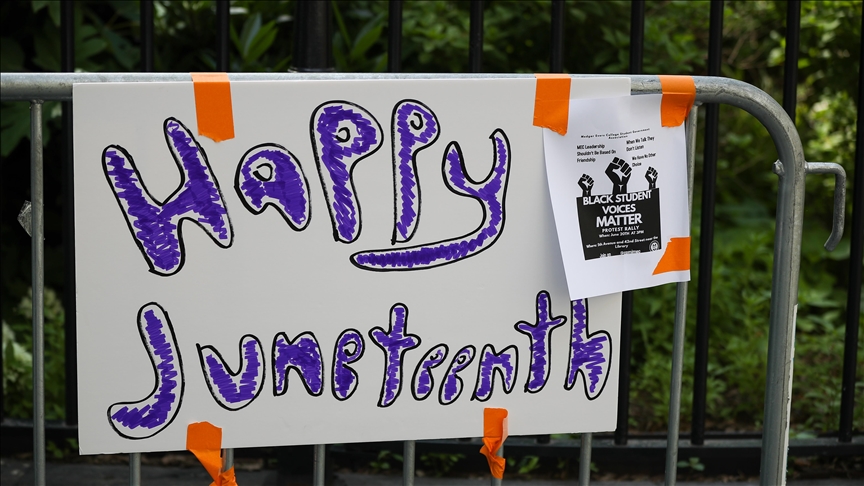Global Courant
HOUSTON, USA
Juneteenth is the day Americans remember the nearly 250,000 enslaved people who learned they had been freed in Galveston, Texas, but more than two years after President Abraham Lincoln signed the treaty.
The Emancipation Proclamation, which abolished slavery and two months after the end of the US Civil War.
“Up until that point, the United States was still a slave state because you’re not free until everyone is free,” said Derek Handley, an assistant professor at the University of Wisconsin-Milwaukee and a faculty affiliated with the Department of Africa and Africa. Diaspora Studies and Urban Studies.
“The USA didn’t really become a free state until the Blacks in Galveston, Texas found out they were free. They were legally free, but the information was kept from them and they were still being abused.”
The meaning of that day began to be known as a word formed by combining the words Juneteenth, June veteenth.
Although it was first recognized as a public holiday in Texas in 1980, it wasn’t until 2021 that President Joe Biden signed into law a law making Juneteenth a federal holiday.
“Juneteenth was not even known to many Black people, especially outside of Texas,” Handley said.
“When I was growing up in Pittsburgh (Pennsylvania), I hadn’t even heard of this or that more than two years after the Emancipation Proclamation was signed.”
Handley stressed that Juneteenth should be recognized to remember the injustices faced by freed slaves.
“The signatories of the Declaration of Independence and the U.S. Constitution were slave owners and got rich from owning slaves. We can’t sugarcoat this. “Thomas Jefferson created a wonderful document, but it also enslaved people.”
“We can separate black and white, but that’s part of American history. But what happens to Blacks can happen to other people.”
scourge of racism
However, the abolition of slavery did not end racism in the United States, and Handley believes Juneteenth is an opportunity for Americans to acknowledge the racial division in the country and work for a more acceptable society.
“It’s about making it better for Americans and for everyone, not just Black Americans,” he said.
“As an African-American, it’s time to accept the past and understand that all of Black America was technically free at that time, but it’s also time to think about what we can do better, what we need to keep working on, and what freedoms we need to work on more. ”
He emphasized that the way to make America better is to be an active participant in democracy.
“What we can do better in America is for more people to pay attention, more people to vote, more local coverage of issues in the Black community, and people to talk to each other instead of talking to each other,” Handley said.
“If you do not vote, do not participate, and do not make your voice heard, you cannot have a say. Be active, present and involved in your local government, local school board. If you want to make a change and see results, you must actively participate in our democracy.”
In recent years, a cultural debate has raged in America over the history of slavery and how it should be taught in schools, as well as the teaching of critical race theory, which states that racial prejudice is inherent in legal and social institutions. that it was designed and implemented primarily by white people.
In addition, high-profile deaths of Blacks over the past few years – including George Floyd, who was killed by white police officer Derek Chauvin by kneeling for more than nine minutes – have made America more aware of racism and police brutality. against blacks.
Handley said it’s important for people to learn lessons from these tragic events in order to thrive as a society, adding that June 15 is a day when Americans can consider making improvements in communities across the country.
“We need to listen to each other and understand the different perspectives of people and cultures. “It’s not about brainwashing, it’s about teaching history,” he said.
“Injustice everywhere is a threat to justice everywhere.”
Only some of the news presented to subscribers in the AA News Broadcasting System (HAS) and in summary form are available on the Anadolu Agency website. Please contact us for subscription options.








